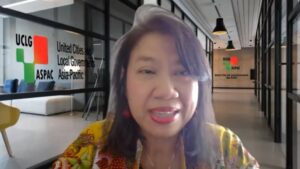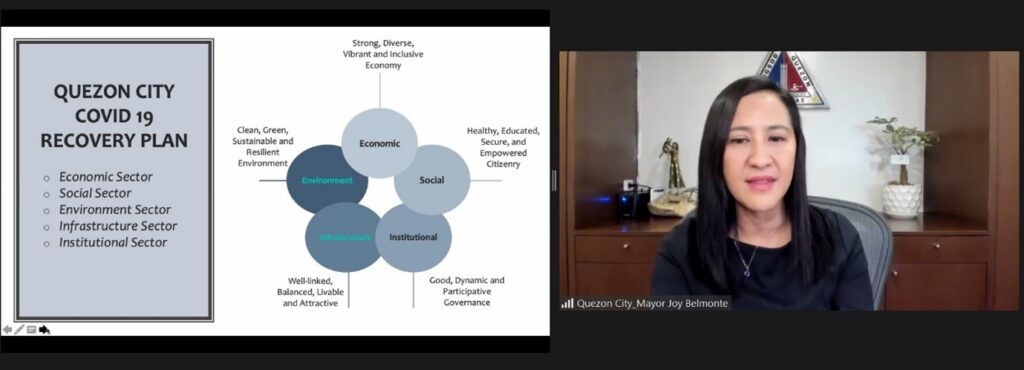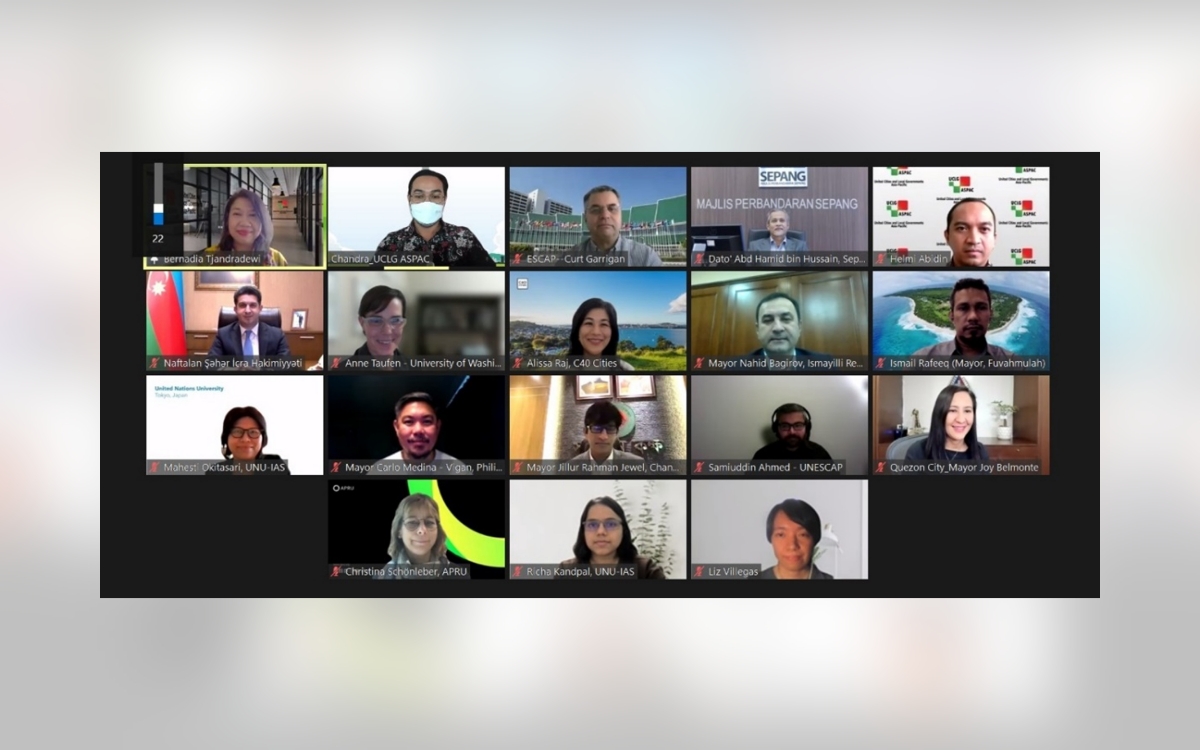11 January 2022 | THE Asia-Pacific Mayors Academy continued to strengthen capacities of local leaders at its second module which focused on COVID-19 recovery. The capacity building activity was still held online due to the pandemic challenge.
 In her welcome message, UCLG ASPAC Secretary General Dr. Bernadia Irawati Tjandradewi discussed how a dedicated module on COVID-19 response and recovery was introduced since the second batch of the Academy given the important role of local governments as frontliners in the battle against the pandemic. The current module aimed to introduce COVID-19 recovery frameworks and link COVID-19 recovery with sustainable development.
In her welcome message, UCLG ASPAC Secretary General Dr. Bernadia Irawati Tjandradewi discussed how a dedicated module on COVID-19 response and recovery was introduced since the second batch of the Academy given the important role of local governments as frontliners in the battle against the pandemic. The current module aimed to introduce COVID-19 recovery frameworks and link COVID-19 recovery with sustainable development.
During the session on COVID-19 Recovery Framework, Mr. Curt Garrigan, Chief of Sustainable Urban Development Section of UNESCAP, highlighted the three main pillars of their work on COVID-19 recovery: 1) protecting people and enhancing resilience, 2) supporting economic recovery, and 3) restoring supply chains and supporting small and medium enterprises. He added that their work on the urban environment is guided by the UN Secretary General’s Policy Brief on COVID-19 in an Urban World. The importance of climate action and green and just recovery was the core message of the presentation from Ms. Alissa Raj, Deputy Director for East, Southeast Asia, and Oceania of C40 Cities. Based on nine guiding principles of green and just recovery, Mayors were encouraged to take action on three categories: 1) jobs and an inclusive economy, 2) resilience and equity, and 3) health and wellbeing.

Local governments’ initiatives towards COVID-19 recovery were also shared through case presentations from Quezon City and Iriga City and breakout sessions among Academy Fellows. Mayor Josefina Belmonte of Quezon City stressed on the holistic recovery approach grounded on the sustainable development goals and linked to existing local development and climate action plans. Mayor Madelaine Alfelor of Iriga City, as an alumnus of the Academy, conveyed the compounded challenge of the pandemic and natural disasters, and how the city addressed these through the adoption of various initiatives, reforms, and policies to support economic development.
UCLG ASPAC and UNU-IAS conducted a study on COVID-19 and Progress on Subnational Localisation of the SDGs. Highlights of the study were presented by Dr. Mahesti Okitasari, Research Associate at UNU-IAS and one of the principal authors of the study. The observed subnational governments indicated healthcare access, poverty reduction and employment creation, and food security as top three desired policy areas to overcome the COVID-19 crisis. Local governments identified policy coordination, additional resources and support, and cooperation with other stakeholders as policy tools for successful exit and recovery strategy. The research on blue-green-grey infrastructure was presented by Dr. Anne Taufen, Associate Professor from the University of Washington and part of the Association of Pacific Rim Universities. Blue-green-grey infrastructure referred to the functional and relational open space of metropolitan regions which is important for its contribution to bio-function, social cohesion, cultural identity, political connections, and psychological restoration. She also highlighted the role of these spaces in crisis protection and response by absorbing the shock from extreme weather events and providing places for people to gather and recover. Dr. Taufen further underscored how outdoor gathering places were essential during the COVID-19 pandemic. She urged Mayors to think about shared liveability today for disaster reduction tomorrow which connects COVID-19 and recovery to sustainable development.
The synergies between the Voluntary Local Review (VLR) process and COVID-19 recovery process were shared and discussed by UNESCAP Regional Sustainable Development Consultant Mr. Samiuddin Ahmed. He stated that the COVID-19 recovery process should seize opportunities to go beyond “business as usual” and address the structural issues that have existed in cities long before the pandemic. He added that the recovery planning process have features and components of the VLR such as stakeholder engagement, conducting holistic review, and setting out future plans, among others.
Prior to the conclusion of the module, Mayors engaged in a group exercise where they presented and discussed their COVID-19 recovery plans, its contribution to the SDGs, and the challenges they have experienced.
UCLG ASPAC is a permanent member of the Academy’s Advisory Board. More information on the Asia-Pacific Mayors Academy is available in its official website:
https://www.asiapacificmayorsacademy.org/











